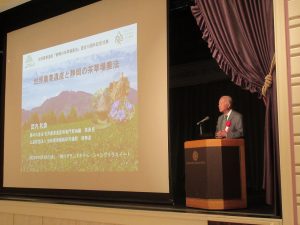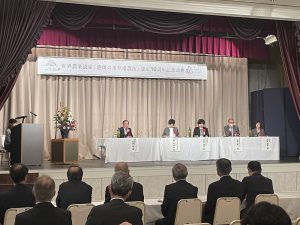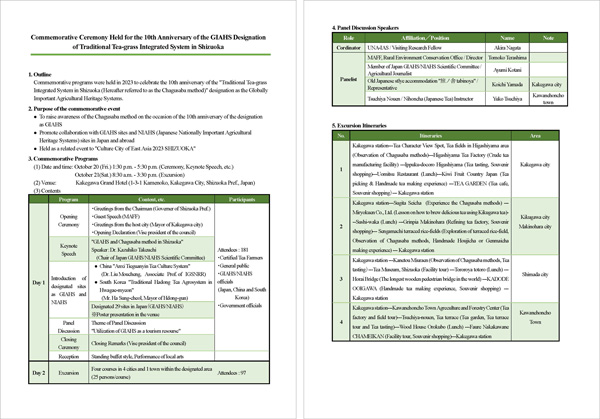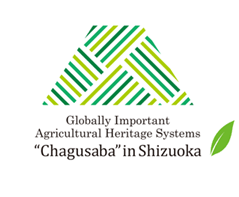


10th Anniversary of the GIAHS Designation
Commemorative Ceremony Held for the 10th Anniversary of the GIAHS Designation of Traditional Tea-grass Integrated System in Shizuoka
Shizuoka’s Traditional Tea-grass Integrated System was recognized as one of the Globally Important Agricultural Heritage Systems (GIAHS) at the international conference held in Ishikawa Prefecture in May 2013. This year it celebrates its 10th anniversary. Shizuoka Prefecture is not only one of Japan’s leading tea growing areas and tea production centers, but also a “tea capital” with numerous resources related to tea, including history, culture, and beautiful tea field scenery.And the “Chagusaba” semi-natural grasslands where the Traditional Tea-grass Integrated System farming method is practiced are a very valuable part of the cultural landscape.
On Friday, October 20, 2023, the Council for the Promotion of Chagusaba in Shizuoka as a GIAHS Site (Secretariat:Shizuoka Prefectural Government) held a ceremony at Kakegawa Grand Hotel in Kakegawa City to celebrate the 10th anniversary of the designation. On the following day (Saturday, October 21), an excursion to four cities and one town in the designated area was offered (Kakegawa, Kikugawa, Shimada, Makinohara, and Kawanehoncho town).
1 Commemorative Ceremony
The ceremony was attended by 181 people, including national and prefectural government officials, those certified to practice the Traditional Tea-grass Integrated System, and those in charge of Agricultural Heritage sites in Japan and abroad. In his keynote speech, Dr. Kazuhiko Takeuchi, chairman of the GIAHS/NIAHS Expert Committee of the Ministry of Agriculture, Forestry and Fisheries, spoke about the importance of maintaining and passing on the Chagusaba farming practice by communicating its contribution to the realization of a decarbonized society and the reduction of environmental impact both in Japan and abroad. He also talked about how important it was to verify the scientific superiority of the practice and to add value to tea. Other presentations included introductions of GIAHS sites in China and South Korea. A panel exhibition of 25 World and Japanese Agricultural Heritage sites in Japan was also held. During the panel discussion, there was a lively debate on how to utilize GIAHS and NIAHS sites as tourism resources.
 |
.jpg) |
|
| Keynote Speech | Introduction of a designated area outside Japan(Anxi County, Quanzhou City, Fujian Province, China) |
.jpg) |
 |
|
| Introduction of a designated area outside Japan(Hadong-gun, Gyeongsangnam-do, South Korea) | Panel Discussion |
2 Excursion (bus tour with hands-on experience)
Bus tours were offered to the GIAHS areas of Kakegawa City, Kikugawa City, Makinohara City, Shimada City, and Kawanehoncho Town. The tour was divided into four separate courses, with a maximum of 25 per course and 100 people in total. There was a considerable turnout of 97 people, with some courses so popular there was a waiting list for cancellations. Of the participants, 75 were members of the general public, including 28 residents of the Tokyo metropolitan and Chukyo areas, making this a great opportunity to teach people about the tea industry and the Chagusaba farming practice in the prefecture.
One participant commented, “I felt the enthusiasm the people I visited had for preserving the traditional tea culture of the region for the next generation, and it made me want to support them.”
-300x225.jpg) |
-300x225.jpg) |
|
| Explanation at a tea plantation | Participants cutting grass in a Chagusaba |
The council will continue efforts to develop Shizuoka’s Traditional Tea-grass Integrated System into a brand by verifying the scientific superiority of the tea cultivated by the farming method, conducting biodiversity surveys, and affixing stickers on tea products that certify they were produced with the method. It will also work to raise awareness of the agricultural heritage site in cooperation with the Ministry of Agriculture, Forestry and Fisheries of Japan and other regions in Japan that have been certified as Agricultural Heritage sites.
We hope that the efforts of farmers working to produce high quality tea will help ensure that Shizuoka’s Chagusaba farming practice continues, preserve cultural landscapes, and revitalize local communities by helping more people understand the many amazing benefits of the farming practice, such as protecting satoyama environments inhabited by diverse flora and fauna.
<Outline of the event>



